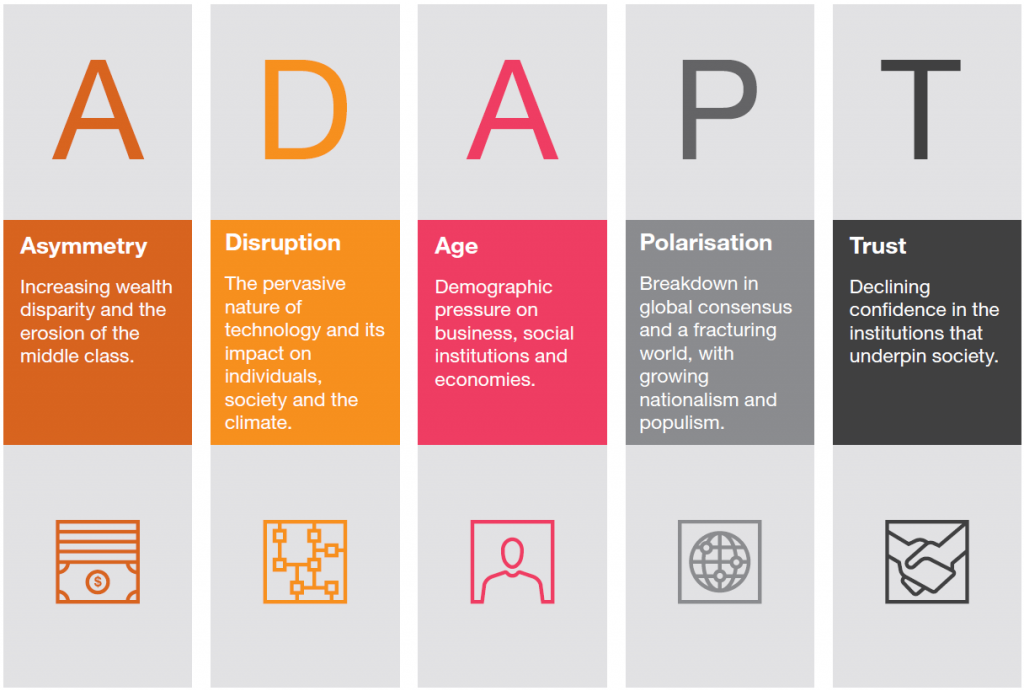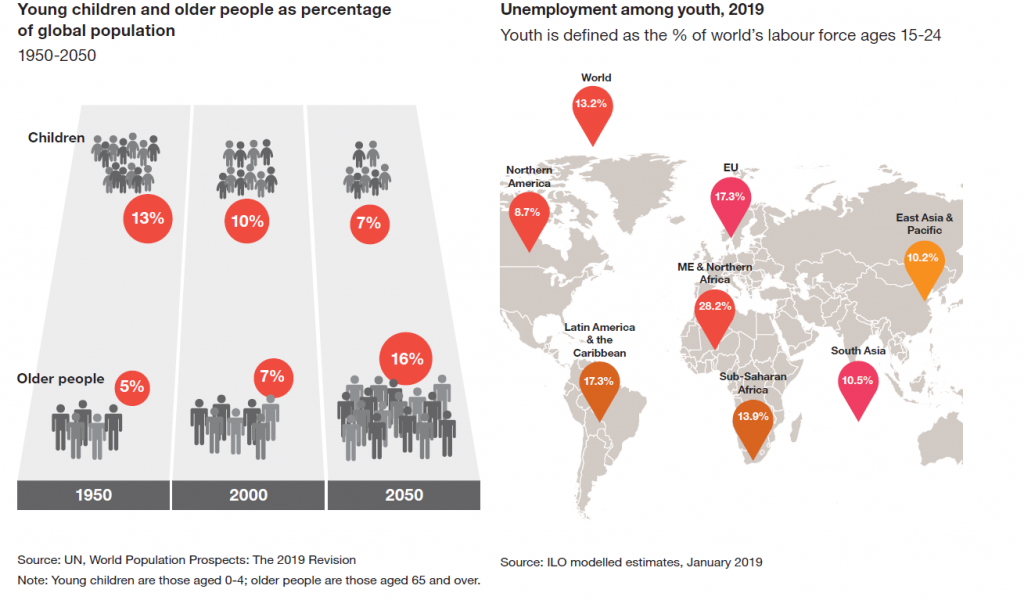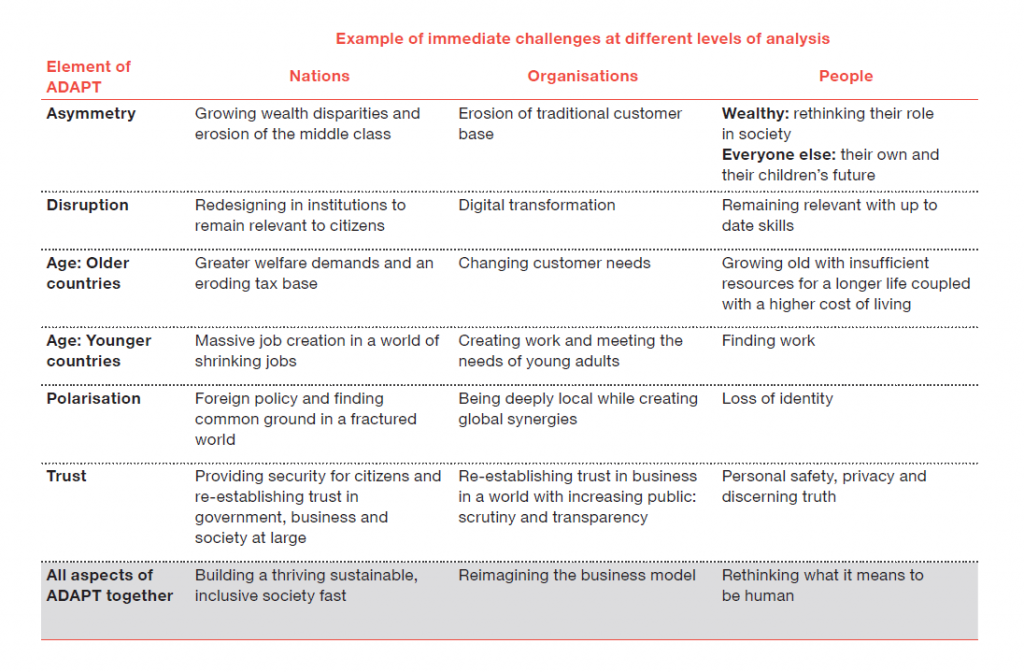The late 20th century “economic acceleration” has created societal and environmental challenges. After years of growing income inequality, concerns about technology-driven disruptions, and rising societal discord globally, the combined health and economic shocks of 2020 have put economies into freefall. Today it is more important than ever to access the Challenges of 21st Century, and to check how education may help to address these.
We find that Megatrends induced by Technologies and they have transformed our world even faster than we predicted. We believe this is due to the interaction between the trends which has turbocharged the speed and pervasiveness of change.
Here we try to classify the Global Issues of 21st century which accost the entire humanity.

Asymmetry
Increasing wealth disparity and the erosion of the middle class
Global wealth disparity has reached such a significant level that, as of 2019, 44% of the world’s wealth was held by less than 1% of the population, including over 168,000 individuals with a net worth over USD 50 million.1 According to UBS/PwC, the number of billionaires in the world exceeded 2,000 individuals in 2018 and, while the number of billionaires in Asia shrank, the number in the US rose over 2017.2
At the same time, there is a continued erosion of the middle class in both developed and developing economies, driven predominantly by two trends: technology replacing jobs and a lack of investment in innovation to create jobs.
The middle class has been growing faster than its wealth; adult population in this group is predicted to grow by 22.2% by 2022, while its wealth is expected to increase by 20.4%.

Disruption
The pervasive nature of technology and its impact on individuals, society and the climate
The proliferation and impact of breakthrough technologies – ranging from artificial intelligence and robotics to augmented reality and blockchain – are occurring, and at a faster rate than ever anticipated. Moreover, these new technologies are leading to the creation of new business models, especially for start-ups unencumbered by the infrastructure of the previous century. Once new business models are developed, they are often applied across industries, leading to the blurring of traditional boundaries (e.g. Amazon, Tencent).
As new, technology-driven models transform industries, capital replaces people and we estimate 30% of UK jobs, 38% of US jobs, 35% of German jobs and 21% of Japanese jobs could be at risk of automation by the early 2030s.1
The social and political implications of this transformation are as vast as the business implications for industry incumbents: economies literally will not be able to afford themselves as tax bases erode and the jobless can no longer consume goods without some form of income. There is increased certainty and accuracy of scientific predictions about the rate and effect of human impact on the climate.1
Global warming is likely to reach 1.5°C between 2030 and 2052 if it continues to increase at the current rate. Climate-related risks to health, livelihoods, food security, water supply, human security, and economic growth are projected to increase with global warming of 1.5°C.2
Pressure on resources will increase dramatically. The global population is expected to demand 35% more food by 2030. The types of food in demand – vegetable oils, dairy, meat, fish and sugar – have a high impact on energy and water. Plant disease is predicted to have a drastic effect on crop growth and cultivation, posing a threat to global food security.3
Interconnectivity between climate change and resource scarcity amplify the impact: climate change could reduce agricultural productivity by a third across Africa over the next 60 years. Globally, demand for water will increase by 40% and for energy by 50%. The world’s economic model is pushing beyond the limits of the planet’s ability to cope.
Ten Years to Midnight: Conquering the four urgent global cases
The solutions to the world’s most urgent challenges are within reach, but we only have ten years.
As you look at the crises the world faces, a striking pattern reveals itself. We have ten years to find answers and implement them. We cannot use 20th century logic to meet this challenge. That logic has led to steady improvements in living standards across the world, but it has also given rise to these challenges and failed to meet them. We need systematically different approaches to creating a better future, building on the creativity and power of markets but setting them in a new context.
Age
Demographic pressure on business, social institutions and economies
The global population is on track to reach 8.5 billion before 2030, and the average age is increasing.1 There will be stark contrasts in the challenges faced by older versus younger nations: the average age in Japan will be 53, while in Nigeria it will be 22.2
In the aging economies, older workers will need to work longer and learn new skills to remain relevant. Moreover, governments may seek to supplement the workforce with migrant populations and, in some cases, higher participation by women. At the same time, the numbers of the very old will increase too, putting a strain on healthcare, pensions, entitlement programmes and public debt.
In younger economies, governments will be faced with chronically high youth unemployment – no matter what level of education has been achieved by these individuals – and, if unsuccessful in addressing these issues, they may face increasing social unrest.

Polarization
Breakdown in global consensus and a fracturing world, with growing nationalism and populism
Economic growth has become disconnected from social progress leading many people to re-examine long-standing assumptions relating to their country’s role in the world.
As people have become disillusioned, the impacts of globalisation, automation and economic shifts have led to a rise in populism. This has typically manifested itself as an opposition of a self-defined ‘common people’ against the elites they believe are in control of national and international governance and commerce.
In this environment, a new nationalism is taking hold, with many countries prioritising their own interests. One manifestation is in corporate tax reduction, with countries increasingly competing to lure back corporations. At the same time, changes in bilateral trade agreements – including the imposition of protectionist tariffs – will cause companies to re-think their manufacturing practices. Many governments are restricting immigration and access to work visas and increasing data-localisation requirements. Overall, there is a growing tension in cross-border business.
Trust
Declining confidence in the institutions that underpin society.
The erosion of trust in institutions began years ago as organisations and governments grew larger and became increasingly detached from the societies they represent. This trend accelerated with the financial crisis.
The general population’s trust in institutions improved slightly between 2019 and 2020 based on a survey of 26 countries, but it’s fair to say that trust is still a rare commodity.1
At first, technology appeared to offer a way to build trust: large, impersonal institutions could offer something close to a personalised service or a way to interact through peer-to-peer platforms. However, as we learn more about the implications of technology, trust is increasingly eroding. Data security breaches, the manipulation of social media and the spread of fake news are all leading individuals to question the organisations responsible.
If governments, businesses and institutions can’t find a way to rebuild trust, they will struggle to drive the level of change needed in such a dynamically changing world.
Immediate Implications

References
- https://www.pwc.com/gx/en/issues/adapt.html
- World Bank Document
- National Intelligence Council: Global Trends 2030: Alternative Worlds
- PwC UK Economic Outlook March 2017
- UN, World Population Prospects: The 2019 Revision
